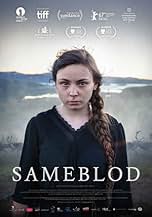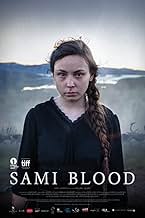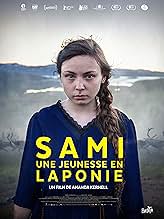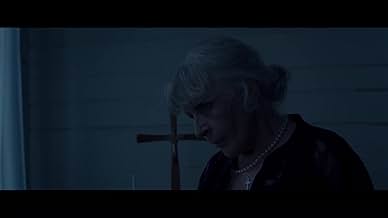VALUTAZIONE IMDb
7,3/10
8578
LA TUA VALUTAZIONE
Una ragazza Sámi che alleva renne che è esposta al razzismo del 1930 nel suo collegio, inizia a sognare un'altra vita.Una ragazza Sámi che alleva renne che è esposta al razzismo del 1930 nel suo collegio, inizia a sognare un'altra vita.Una ragazza Sámi che alleva renne che è esposta al razzismo del 1930 nel suo collegio, inizia a sognare un'altra vita.
- Premi
- 26 vittorie e 18 candidature totali
Maj-Doris Rimpi
- Elle Marja
- (as Maj Doris Rimpi)
- …
Recensioni in evidenza
Sami Blood was so much different than a typical movie about prejudice and culture. Maj-Doris Rimp (Elle Marja) and all the people portraying Sami People were real Laplanders. Obviously, Elle Marja, the lead actor as characterized in the movie came from being raised as a Laplander and that is where she got her education in life because" there is no university like adversity"("the School of Hard Knocks").
What is striking is that unlike typical Swedes or Sami People, Elle Marja understands this desire and social need that all people should acculturate themselves to the cultures of other people who have different values than you--but on your own terms! Why?:Because: "If you see in any given situation only what everybody else can see, you can be said to be so much a representative of your culture that you are a victim of it." ~S. I. Hayakawa
As i watched the people in this movie talking about "Yoiking" (Sami music) I went to YouTube and listened to "Yoik of the Wind." If you were way up in the mountains in the wilderness this is the feeling you would express. The ending of this movie really floored me too and wrapped up the whole picture expressing the character and moral of the story through this woman's finale. By The Way, I'm a 71 year old Irish-American avid movie watcher and found this movie to be well worth watching for anybody. I have never reviewed any movie but couldn't understand why I have never seen SAMI BLOOD" listed on top foreign genre movie lists.
What is striking is that unlike typical Swedes or Sami People, Elle Marja understands this desire and social need that all people should acculturate themselves to the cultures of other people who have different values than you--but on your own terms! Why?:Because: "If you see in any given situation only what everybody else can see, you can be said to be so much a representative of your culture that you are a victim of it." ~S. I. Hayakawa
As i watched the people in this movie talking about "Yoiking" (Sami music) I went to YouTube and listened to "Yoik of the Wind." If you were way up in the mountains in the wilderness this is the feeling you would express. The ending of this movie really floored me too and wrapped up the whole picture expressing the character and moral of the story through this woman's finale. By The Way, I'm a 71 year old Irish-American avid movie watcher and found this movie to be well worth watching for anybody. I have never reviewed any movie but couldn't understand why I have never seen SAMI BLOOD" listed on top foreign genre movie lists.
Background: The Sámi (often called Lapps by outsiders) peoples have occupied the northern regions of the three Nordic countries, and an adjacent part of Russia for at least the past 10,000 years. Totally around 100,000 peoples in the above mentioned geography (another 30,000 in N. America) most today live in urban settings, but traditionally and to a rural extent today they are/were either fishermen or hunter-gathers & herders (especially reindeer). They have historically undergone cultural dissolution, with Norway perhaps the most egregious, surprisingly similar to what Native North Americans underwent.
Story: We encounter an older Elle-Marja (but for sometime re-naming herself Christina) at the funeral of her deceased sister, Njenna, we then go into a flashback of her life starting as a young women who leaves her reindeer herding life to pursue a different education, and a life fraught w/danger as she tries to assimilate into a xenophobic/racist Swedish life.
Elle Marja, a native of Lapland, faces xenophobia, while suffering a social and cultural wash imposed by Sweden.
I believe that one of the factors that makes this film interesting is the way it explores the subject, in this case, xenophobia and racism, in a country considered by many to be an almost perfect example of modern societies, Sweden.
The story begins with Elle Marja, as a retired teacher, at her sister's funeral, and then takes us into a flashback, where both are young and start attending school.
The process of abandoning culture, the dialect and the mannerisms and gestures themselves is explored in a good way, it fits the time when the individual shapes his personality (adolescence), which allows us to perceive the attitudes that the character adopts throughout the story development.
The photography is very interesting, with that atmosphere of melancholy and loneliness typical of northern European films.
I believe that one of the factors that makes this film interesting is the way it explores the subject, in this case, xenophobia and racism, in a country considered by many to be an almost perfect example of modern societies, Sweden.
The story begins with Elle Marja, as a retired teacher, at her sister's funeral, and then takes us into a flashback, where both are young and start attending school.
The process of abandoning culture, the dialect and the mannerisms and gestures themselves is explored in a good way, it fits the time when the individual shapes his personality (adolescence), which allows us to perceive the attitudes that the character adopts throughout the story development.
The photography is very interesting, with that atmosphere of melancholy and loneliness typical of northern European films.
Unique little film with some truly great performances by first-time sami actors. Going from beautiful to sad to infuriating to inspiring, this one really does it all. Can't recommend it enough.
Guatemalan Indigenous Leader and Nobel Peace Prize winner Rigoberta Menchu Tum said, "We are not myths of the past, ruins in the jungle, or zoos. We are people and we want to be respected." Unfortunately, however, Indigenous people have been the subject of racism and discrimination throughout history. Massacres, forced-march relocation, the "Indian wars", death by starvation and disease form a depressing legacy of man's inhumanity to man. Inspired by the personal experience of director Amanda Kernell's grandmother, the deeply moving Sami Blood is about what Kernell has called an "untold" story and a "dark chapter" in Swedish history. She is referring to the oppression of the indigenous Samis, also known as Lapps, an indigenous people who live in the far northern areas of Norway, Sweden, Finland, and Russia.
Shot by cinematographers Sophia Olsson and Petrus Sjövik, the film is set in Sweden in the 1930s when the rising tide of nationalist fervor dominated Europe and led to the Nazi's embrace of Eugenics and the theory of the master race. Sami Blood opens in the present day, however, as ninety-year-old Christina (Maj Doris Rimpi) returns to Lapland with her son and granddaughter to attend the funeral of her estranged sister. Traditional yoik-singing does not prevent Christina from becoming morose and withdrawn, retreating to a hotel by herself. The film then flashes back eighty years to the time when Christina (Lene Cecilia Sparrok), then known as Elle-Marja, was a precocious 14-year-old girl living with her sister Njenna (Sparrok's own sister Mia Erika) and her recently widowed mother (Katarina Blind), engaged in reindeer herding.
As in the US and Canada where Native children were sent to residential schools where their language, religion and cultural beliefs were often the object of ridicule, the sisters are sent to a special boarding school where they learn the hard lesson that the world regards them as lesser human beings. The Sami girls are dismissed by local Swedish teens as "circus animals" and "filthy Lapps," and are subject at school to being measured and photographed to prove a physical basis for their inferiority. While singled out for her learning ability by her deceptively supportive teacher, Christina (Hanna Alstrom, "Kingsman: The Secret Service"), Elle-Marja's inquiries about becoming a teacher meets with the reply that Sami's have small brains and are not capable of functioning outside of their own community. "Studies have shown that your people can't get by in town you have to stay here or you'll die out," she says.
In spite of her humiliation, Elle-Marja is able to dream of a more productive future. It is a future, however, that will cause her to turn her back on her family and her heritage, a betrayal that will mark her entire life. In one scene, Elle Marja, who is trying to pass herself off as a "normal Swede," blurts out to her sister, "Get away, you filthy Lapp." When she meets Niklas (Julius Fleischlanderl, "Young Sophie Bell") a good-looking Swedish boy from Uppsala who does not know that she is Sami, her dreams of escaping from the school begin to become real. After her mother refuses to sell a reindeer in order to pay for the education Elle-Marja requires to become a teacher, she changes her name to Christina and pursues her relationship with Niklas.
Showing up at his upscale home, Christina untruthfully tells his mother that Niklas said that she could stay with them. In spite of their growing connection which includes staying overnight in his room, he does not defend her when his mother discovers her to be a Sami and she is asked to leave. She remains determined, however, to start a new life regardless of the barriers she faces. Though Sami Blood covers familiar ground, the pain caused by discrimination can never be routine. What elevates the film to a different level, however, is the quiet but fiercely determined performance of Lena Cecilia Sparrok as Elle-Marja/Christina. While the film is about oppression, it is not a polemic but a human document that transcends the limitations of its environment and makes a universal statement about the longing to fit in, the fear of isolation, and the conflict between the life we are born into and the one we choose for ourselves.
Shot by cinematographers Sophia Olsson and Petrus Sjövik, the film is set in Sweden in the 1930s when the rising tide of nationalist fervor dominated Europe and led to the Nazi's embrace of Eugenics and the theory of the master race. Sami Blood opens in the present day, however, as ninety-year-old Christina (Maj Doris Rimpi) returns to Lapland with her son and granddaughter to attend the funeral of her estranged sister. Traditional yoik-singing does not prevent Christina from becoming morose and withdrawn, retreating to a hotel by herself. The film then flashes back eighty years to the time when Christina (Lene Cecilia Sparrok), then known as Elle-Marja, was a precocious 14-year-old girl living with her sister Njenna (Sparrok's own sister Mia Erika) and her recently widowed mother (Katarina Blind), engaged in reindeer herding.
As in the US and Canada where Native children were sent to residential schools where their language, religion and cultural beliefs were often the object of ridicule, the sisters are sent to a special boarding school where they learn the hard lesson that the world regards them as lesser human beings. The Sami girls are dismissed by local Swedish teens as "circus animals" and "filthy Lapps," and are subject at school to being measured and photographed to prove a physical basis for their inferiority. While singled out for her learning ability by her deceptively supportive teacher, Christina (Hanna Alstrom, "Kingsman: The Secret Service"), Elle-Marja's inquiries about becoming a teacher meets with the reply that Sami's have small brains and are not capable of functioning outside of their own community. "Studies have shown that your people can't get by in town you have to stay here or you'll die out," she says.
In spite of her humiliation, Elle-Marja is able to dream of a more productive future. It is a future, however, that will cause her to turn her back on her family and her heritage, a betrayal that will mark her entire life. In one scene, Elle Marja, who is trying to pass herself off as a "normal Swede," blurts out to her sister, "Get away, you filthy Lapp." When she meets Niklas (Julius Fleischlanderl, "Young Sophie Bell") a good-looking Swedish boy from Uppsala who does not know that she is Sami, her dreams of escaping from the school begin to become real. After her mother refuses to sell a reindeer in order to pay for the education Elle-Marja requires to become a teacher, she changes her name to Christina and pursues her relationship with Niklas.
Showing up at his upscale home, Christina untruthfully tells his mother that Niklas said that she could stay with them. In spite of their growing connection which includes staying overnight in his room, he does not defend her when his mother discovers her to be a Sami and she is asked to leave. She remains determined, however, to start a new life regardless of the barriers she faces. Though Sami Blood covers familiar ground, the pain caused by discrimination can never be routine. What elevates the film to a different level, however, is the quiet but fiercely determined performance of Lena Cecilia Sparrok as Elle-Marja/Christina. While the film is about oppression, it is not a polemic but a human document that transcends the limitations of its environment and makes a universal statement about the longing to fit in, the fear of isolation, and the conflict between the life we are born into and the one we choose for ourselves.
Lo sapevi?
- QuizAll the Sámi characters are played by real life Sámi people.
- Citazioni
Elle Marja: [to Njenna] Don't yoik at school...
- ConnessioniEdited from Stoerre Vaerie (2015)
I più visti
Accedi per valutare e creare un elenco di titoli salvati per ottenere consigli personalizzati
- How long is Sami Blood?Powered by Alexa
Dettagli
- Data di uscita
- Paesi di origine
- Siti ufficiali
- Lingue
- Celebre anche come
- Sameblod
- Aziende produttrici
- Vedi altri crediti dell’azienda su IMDbPro
Botteghino
- Lordo in tutto il mondo
- 442.416 USD
- Tempo di esecuzione1 ora 50 minuti
- Colore
- Proporzioni
- 2.35 : 1
Contribuisci a questa pagina
Suggerisci una modifica o aggiungi i contenuti mancanti

Divario superiore
By what name was Sami Blood (2016) officially released in India in English?
Rispondi






















